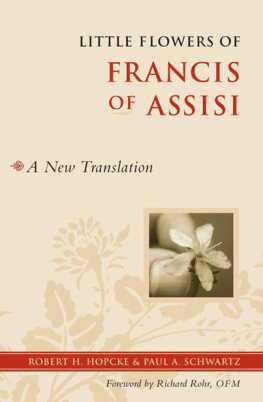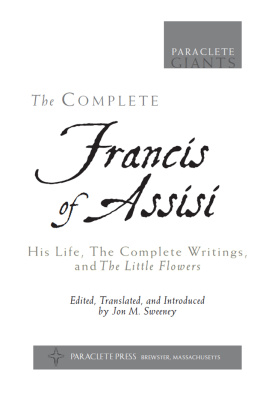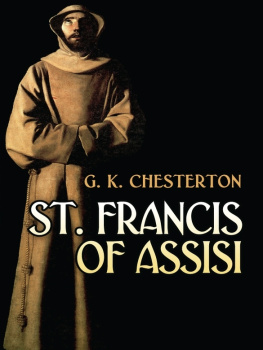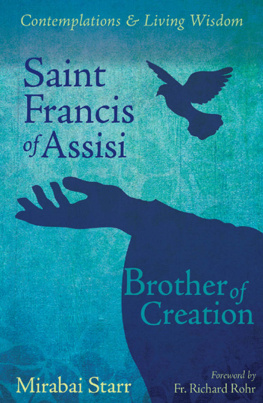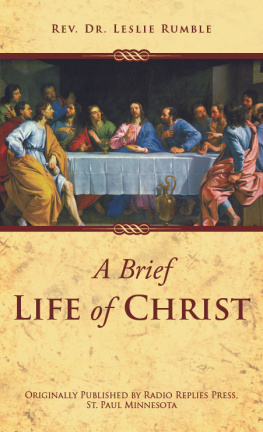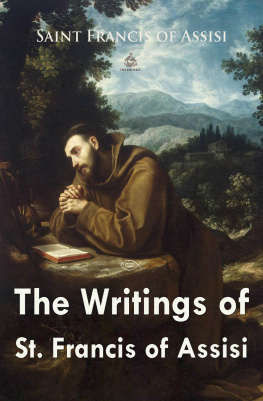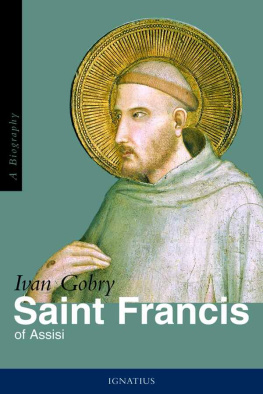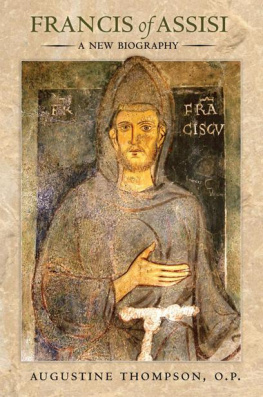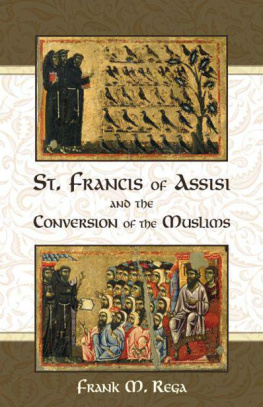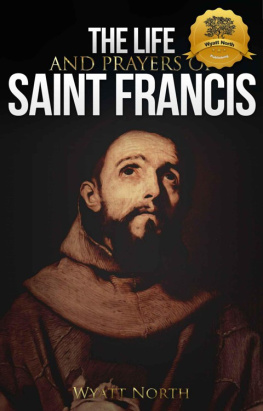Hopcke and Schwartz succeed in telling the tales of Franciss ministry... in readable and simple language for contemporary American readers.... The compact and nicely translated collection is sure to accomplish its mission of presenting the life of this beloved saint.
Publishers Weekly
This fresh and vibrant new translation of charming tales from the life of St. Francis of Assisi highlights the radical way that Francis lived out the Gospel. These storiessome legendary, some based in fact, some well known, some more obscureclearly show the revolutionary impact that Francis had on his contemporaries, and how following the teachings of Jesus can be a subversive way of life. First written in the early fourteenth century, the Little Flowers remain a dramatic challenge to a world still obsessed with wealth, power, and self-interest.
James Martin, SJ, Associate Editor, America, and author of My Life with the Saints
What a delight to have Hopckes and Schwartzs lively renderings. In the spirit of the Italian vernacular in which they were first told and written, these tales of St. Francis show his earthiness, sensuous love of life, occasional vulgarity, and deep spiritual wisdom . Pace e bene!
Jon M. Sweeney, author of The St. Francis Prayer Book and The Lure of the Saints
ABOUT THE BOOK
This collection of folk tales, legends, and narratives about the life of Francis of Assisi and his followers appeared about seventy-five years after the saints death, in the early fourteenth century. The writings have remained popular ever since due to their beauty and charm, and because they are the nearest thing to a biography of Francis that exists. They are the source of many of the most famous stories about Francisincluding the accounts of his preaching to the birds and of his receiving of the stigmataand they are based on stories that circulated about him in the years after his death.
Robert Hopcke and Paul Schwartz provide the first truly new translation of the Fioretti in forty years, and in doing so they bring the spiritual classic up to date, using contemporary language to show Francis to be a living, breathing human being who walked the streets of Assisi in a state of spiritual, physical, and social enlightenment, through his own existence making Christ real in the world.
The translators have also edited the work to present the stories that most powerfully present Franciss spirit and teaching.
ROBERT H. HOPCKE is a licensed marriage and family therapist with degrees in both pastoral and clinical counseling. He is the author of numerous books, including There Are No Accidents and Living the Mysteries: The Spiritual Power of the Rosary in the Lives of Contemporary People.
PAUL A. SCHWARTZ holds a doctorate in theology from the Graduate Theological Union in Berkeley, California, where he was Project Director of the Center for the Study of New Religious Movements. He has served on the faculty of San Francisco State University and of the California Institute of Integral Studies.
Sign up to learn more about our books and receive special offers from Shambhala Publications.

Or visit us online to sign up at shambhala.com/eshambhala.
Little Flowers of Francis of Assisi

A New Translation
by R OBERT H. H OPCKE
& P AUL A. S CHWARTZ
FOREWORD BY RICHARD ROHR, O.F.M

New Seeds
B OSTON & L ONDON
2013
New Seeds Books
An imprint of Shambhala Publications, Inc.
Horticultural Hall
300 Massachusetts Avenue
Boston, Massachusetts 02115
www.shambhala.com
2006 Robert H. Hopcke and Paul A. Schwartz
Cover photograph by Steffen Thalemann/Nonstock/Jupiterimages
Cover design by Graciela Galup
All rights reserved. No part of this book may be reproduced in any form or by any means, electronic or mechanical, including photocopying, recording, or by any information storage and retrieval system, without permission in writing from the publisher.
Library of Congress Cataloging-in-Publication Data
Fioretti di San Francesco. English.
Little flowers of Francis of Assisi: a new translation / by Robert H. Hopcke and Paul A. Schwartz; foreword by Richard Rohr.1st ed.
p. cm.
eISBN 978-0-8348-2867-4
ISBN 978-1-59030-375-7 (pbk.: alk. paper)
1. Francis, of Assisi, Saint, 11821226. I. Hopcke, Robert H.,
1958 II. Schwartz, Paul, 1956 III. Title.
BX4700.F63E5 2006
271'.302dc22
When I found your words, I devoured them; they became my joy and the happiness of my heart, because I bore your name, O Lord, God of hosts.
J EREMIAH 15:16
CONTENTS
I HAVE BEEN A F RANCISCAN for forty-five years, trying to live up to the vision and practice of this larger-than-life (and larger-than-death!) man, called Francis of Assisi. I am told that he has the longest library bibliography of any person in history. He has a long list of would-be imitators too, most of us highly unsuccessful.
We usually read the Little Flowers once or twice while we are in initial formation, but not much afterward. We eventually look for the more objective, historical, and critical accounts of his life, hoping that we will find him a bit more imitable and practical. Not so. Never so.
Thus I am most grateful for this new abridged translation, because the Little Flowers is in a category all its own. It is like the collected sayings of the Buddha or the Zen masters, the stories of the Desert Fathers and Mothers, or the Midrashic collections of the rabbis. Dont get lost in the seemingly romantic details or language; dont let your historical-critical mind alone read the text; and dont start with Is this realistic?or even, Do I like this? (as if my first reactions should be normative). Those are all of the natural resistances of the small self and the controlling mind. The fundamentalist of any stripe always whittles the text down to his own limited knowability, and then either dismisses itor pretends that she actually understands it. This is killing religion, worldwide. There will be no spiritual journey or spiritual growth in these cases.
And yes, the Little Flowers might seem too thirteenth century, too Catholic, too Italian! All of this is true. That is the container in which Saint Francis lived out his spiritual adventure. (There is no such thing as a value-free position!) But dont get trapped inside this container, because he was not trapped there himself, at least not totally. Any less than we are trapped in our own moment, our own culture, and our own context. Lets hope that later centuries will be as kind to us as I ask you to now be with him. Then he can thrill you! And then he can threaten youin the way that saints, mystics, and prophets threaten us all.
I write this forward with very few words. After all, it is a spiritual master that you came to seek, not the warm-up act. And he himself taught not by words, but by actions, events, parables, and songs. These became his bouquet of flowers that he now hands on to another grateful age.
F RIAR R ICHARD R OHR , O.F.M.
Center for Action and Contemplation
Albuquerque, New Mexico
A T THE HEART of every Christians faith is a longing, a natural human longing that is in a way inevitable. If one believes that God chose to be revealed in Jesus, a man who lived a life like ourselveswho had a rich circle of family, friends, and disciples about him as he ate, drank, slept, wept, and carried on his ministry, and who finally experienced the suffering of a state execution ending in physical deathhow can any of us not feel a longing to have been there, to have actually, physically accompanied him in his earthly life? Among those of us who have known Jesus in spirit and in sacrament, who has not at some point in our reveries wondered how it would be to actually grasp his hand in the storm, like Peter; or to serve him a lunch made with love and devotion at our own kitchen table, like Martha; or perhaps to recline against his chest and smell the fragrance of him, washed clean, as did the Beloved Disciple at their final Passover meal together? If given the chance, would we not, like Mary, spend our savings to anoint him with spice, wrap him in crisp linen for his burial, and walk through the wet garden at dawn seeking him in grief and despair? Would we not, if he were before us now, take our own fingers and explore his wounded side, like Thomas; would we not cup our hands, blow on the coals of our bonfire, and cook him some fish as the calm waves of the lakeshore glisten in the morning sun?
Next page
